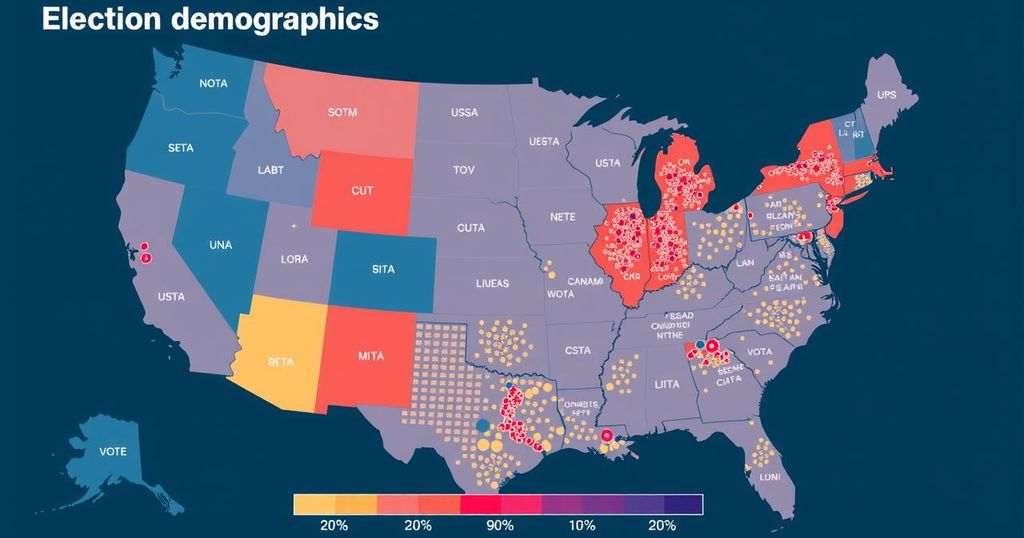Recent polls indicate that Donald Trump holds a significant lead among male voters, particularly young men, showcasing a shift towards Republican ideologies. This trend contrasts with a concerning decline in support from women, attributed to concerns surrounding reproductive rights and gender representation. Trump’s appeal among certain male demographics raises questions regarding the implications for the 2024 election outcome.
Recent polling data from the New York Times indicates that Donald Trump possesses an 11-point lead over Kamala Harris among male voters, showcasing a significant advantage among this demographic in the upcoming election. Traditionally, Trump’s support base has been predominantly comprised of white men; however, he has also made significant inroads with Hispanic-American and African-American men. Despite his history of making disparaging comments about Hispanic communities and employing anti-immigrant rhetoric, approximately 50% of Hispanic men perceive Trump as sufficiently assertive in his presidential role. Historically, Trump has used disinformation tactics, notably questioning Barack Obama’s eligibility to serve as president due to purported concerns regarding his birth certificate. His defense of white supremacists during events in Charlottesville, Virginia, has similarly failed to deter a subset of young African-American men from supporting him, with polls indicating that around 25% of African-American men under the age of 50 plan to cast their vote for him. A substantial proportion of Trump’s support is attributed to young men, particularly those aged 18-29. The polling data revealed that Joe Biden lost traction with a demographic of Democrats who resonated with podcaster Joe Rogan, leading to an advantage for Trump among young male voters, who support him at a rate of 58% to 37% against Harris. The political landscape for young men appears to have shifted rightward, as they are increasingly identifying as Republicans and conservatives, contrasting sharply with the more progressive outlook of young women, which has intensified over the last 25 years. Young men may be drawn to Trump’s persona as he openly challenges societal norms regarding masculinity. According to a YouGov study, nearly two-thirds of American men feel that their representation and valuation in society should increase. Additionally, some studies suggest that young men, who struggle to conform to traditional masculine ideals, find solace in Trump’s rhetoric, which resonates with their insecurities regarding societal expectations. Even as Trump has adopted a more aggressive, locker-room-style approach in his campaigning—characterized by vulgarity and profane commentary—this demeanor has not alienated his core support base. Certain male supporters may harbor fears stemming from women’s advancements in society and perceive these developments as threats to their societal status. Data from Pew Research suggests that one-third of Trump supporters believe that women’s gains come at the expense of men, a sentiment that rises to 40% among men under 50. In stark contrast, Trump’s appeal is not extended to most women, who have largely distanced themselves from him due to his and his running mate J.D. Vance’s problematic rhetoric, particularly surrounding women’s rights. The societal mobilization following the Supreme Court’s 2022 decision to overturn Roe v. Wade has galvanized female voters against Trump. Despite maintaining a narrow lead among white women—one point in 2024 versus seven points in 2020—the gender gap remains pronounced, revealing a critical challenge for his campaign. In summary, the impending election is defined by a notable gender gap influenced by Trump’s appeal to certain male demographics at the expense of losing vital female support. The diverse communication styles of the candidates may play a crucial role in determining the outcome of this historically significant election.
The article examines the shifting political allegiance of male voters towards Donald Trump amidst the 2024 US election campaign, highlighting emerging trends among different subgroups of men, including young men and men of color. It contrasts this trend with the declining support he is receiving from female voters, particularly in light of significant issues such as reproductive rights and gender representation. The piece uses polling data and social research to analyze why some demographics of men are favorably inclined towards Trump and the implications of these dynamics for the election results.
In conclusion, the electoral landscape reveals a complex interplay between gender and political affiliation, with young men increasingly aligning with Trump’s messaging while women mobilize against his presidency. The contrasting sentiments reflect broader societal shifts and underscore the importance of addressing gender dynamics in the political arena as the election approaches. How these trends will ultimately influence voter turnout and election outcomes remains to be seen, but the data indicates a significant gender gap that could impact Trump’s campaign strategy.
Original Source: theconversation.com







